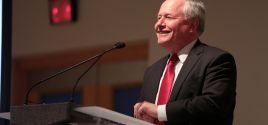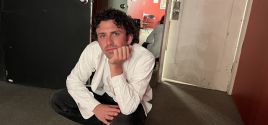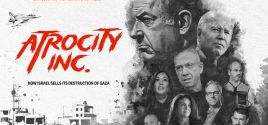The founding fathers save America's soulAndrew SullivanThe Sunday Times Jul. 02, 2006 |
Popular 
Bill Kristol: My Fellow White Americans Are 'The Enemy'

Israel Detains American Journalist for Reporting on Damage from Iran's Strikes [UPDATE]

Journalist Jeremy Loffredo Released After Four Days in Israeli Detention, Ordered Not to Leave

Chris Rufo Discovers Who is Flooding The Small Town of Charleroi, Pennsylvania With Haitian Migrants

WATCH: New Film 'Atrocity Inc' Exposes How Israel Lied About October 7th to Justify Genocide
 The full importance of the United States Supreme Court’s decision in Hamdan vs Rumsfeld took a little time to sink in. Military tribunals to try suspects at Guantanamo Bay were found to be illegal. The administration had breached both American law and the Geneva convention on the treatment of prisoners. The lesson is that even in times of war America is run, not by a president, but by a constitution. The president is not an old-style monarch, empowered in wartime to make up rules as he goes along to defend his subjects. He is not the law. He must obey the law, as all citizens must. And in a series of actions and decisions after 9/11, President George W Bush in effect broke the law, violated his oath of office and pushed the limits of his power beyond the permissible. Not for the first time, in other words, a King George has been dethroned in America. This time, though, it wasn’t the British monarch but a president who had almost come to regard himself as a king in a war with no end. The rebels were not a crew of colonial tax-avoiders, but the Supreme Court set up more than two centuries ago by the first independent Americans. On Tuesday Americans will celebrate that moment on July 4. This year, thanks to the court, Independence Day came early. America is not in essence a geographical entity. When it was founded, it occupied a fraction of the land it now does. Nor is it defined by an ethnic group or a royal line. Its core is essentially a piece of paper, a written constitution, a formal set of procedures designed, before everything else, to protect individual liberty. At the heart of that liberty is the right to a fair trial and the insistence that nobody — especially not the president — can take that away. That constitution has been tested before. It was tested when Abraham Lincoln suspended habeas corpus in the civil war. It was tested when Franklin D Roosevelt interned thousands of Japanese-American citizens in camps during the second world war. It was tested when Richard Nixon turned the presidency into a criminal conspiracy in Watergate. There was never any doubt that the war launched against the United States on September 11, 2001, would test it too. Wars do that, as Lincoln and Roosevelt demonstrate. No war by foreign enemies has implicated the American homeland as profoundly as this one. In retrospect a large part of Bush’s immediate response to 9/11 was understandable, even admirable. Facing a sudden attack, the constitution allows the president to take emergency measures to protect American citizens. He can act swiftly and legally to defend the country as commander-in-chief — and he did. If he hadn’t and further attacks had occurred, he would have been pilloried. It is to his credit that no further attacks have taken place. But the constitution also insists that any emergency powers be temporary, that Congress alone can declare war and regulate the laws of warfare, and that the president’s first task is to protect the constitution, not violate it. He does not have, as this president argued, one “accountability moment” every four years. He is continually accountable to a constitution applicable to everyone. After 9/11, this president and his closest advisers decided otherwise. Dick Cheney and Donald Rumsfeld believed presidential power was overly shackled after Nixon. They saw in 9/11 a golden opportunity to get it back. Yes, they seized emergency powers. But they seized them while claiming they had no need for congressional permission. The president, they claimed, was empowered to be judge, jury and executioner in wartime. Neither Congress nor courts could stop him from his duty to defend Americans. If that meant tearing up the Geneva conventions, violating the constitution, breaking domestic law, setting up ad hoc courts and enforcing torture, so be it. After 9/11, few dissented. What happened last week was the return of constitutional order. The court insisted that the president needed legislative backing for prosecuting terrorists and that he was bound by the laws of warfare passed by Congress. The farcical military tribunals at Gitmo were more suited to a banana republic than the US — and they had to be scrapped. Torture is illegal in America — and the president has no authority to say otherwise. What we saw last week, in other words, was the end of a potential rival regime to constitutional government in America. It doesn’t mean Guantanamo will close. It doesn’t mean that the president cannot detain some individuals indefinitely in wartime. It doesn’t mean the president has no right to take military actions to defend the country as he sees fit. But he must work through constitutional channels, get congressional backing and win court support. If he wants to torture prisoners, he must ask Congress to repeal the law against it. Nor does the Hamdan decision end the debate over presidential power in America. The decision was written by the most senior member of the court — and the one most likely to retire next. Bush’s own appointees, Samuel Alito and John Roberts, favour the notion of an untrammelled executive power in wartime. The vote was essentially 5-4 and Bush is one nominee away from reversing it. The conservative intelligentsia in America have also shifted dramatically from a conservatism that protects the individual from government towards a conservatism that wants to impose democracy abroad and enforce morality at home. These new conservatives are contemptuous of constitutional propriety and limited government. They believe in results, rather than following careful procedures. They will not relent after one court decision. What will ultimately decide this battle for the soul of America will be the people who elect their own representatives to check the president. The court is as evenly balanced as it has ever been. American constitutional democracy is only marginally more secure this Sunday than last. Can democracies fight long — let alone open-ended — wars without ceasing to be democracies? Can we fight barbarians without becoming like them? This has always been an open question, but rarely as open as today. The enemy knows no moral boundaries and no checks on its power. The West is defined by both. What we saw last week was the moment when the most powerful democracy asked itself if it could fight terror and retain its soul. The answer was yes. But the question will come again. Maybe sooner than we think. |



